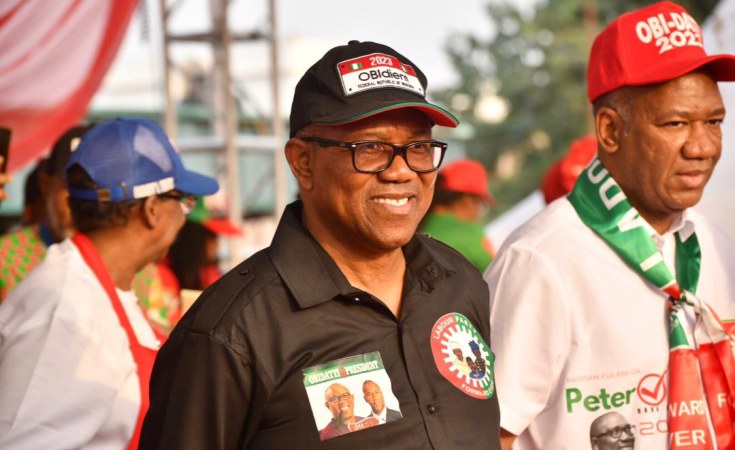A pre-presidential election opinion survey by global business and economic news platform, Bloomberg News, has projected Labour Party's (LP) presidential candidate, Peter Obi as the leading runner ahead of Nigeria's February 25 presidential election.
In the poll conducted by Premise Data Corp for Bloomberg News, Obi was the preferred choice of the respondents ahead of Bola Tinubu of the All Progressives Congress (APC) and Atiku Abubakar of the Peoples Democratic Party (PDP).
The poll result released yesterday showed that the LP candidate garnered 66 per cent of the 93 per cent of respondents' votes.
The candidates of the two parties that have ruled Nigeria since the restoration of democracy in 1999 finished in a distant second and third. Tinubu obtained 18 percent of decided voters and the PDP's Atiku Abubakar tallied 10 percent.
Obi scored a slightly higher 72% among decided respondents in an earlier Premise poll that was released by Bloomberg in September last year as the official election campaign kicked off.
"San Francisco-based Premise polled 2,384 Nigerians from January 26 to February 4 via a smartphone app. Submissions were selected from quotas developed by age, gender, and location across the country's six geopolitical zones, the company said. Results were then weighted against the original quotas to ensure national representation," Bloomberg News said.
Bloomberg reports further on the latest poll result: "While Obi's campaign has generated a momentum that the two established forces in Nigerian politics were not expecting, the ruling All Progressives Congress and main opposition Peoples Democratic Party insist that he cannot triumph on February 25. They say his appeal is too thinly spread across the country's states and have derided polling that has almost universally put the candidate of the much smaller Labour Party in first place.
"Still, Obi has emerged as the most popular candidate in six polls including the two surveys conducted by Premise for Bloomberg. Another poll released this week by Lagos-based media and data company Stears predicted that Obi will win in the event of high turnout, but lose to Bola Tinubu of the APC if participation is weak.
"Dismissed by his opponents as a 'social media candidate,' Obi's rise has been fueled by disenchantment with the status quo. His campaign has attracted an enthusiastic following known as 'Obidients' - initially online but increasingly at rallies and marches - even if the man they wish to help to Nigeria's biggest ever electoral upset hardly has an anti-establishment background.
"A former governor of the southeastern Anambra State and ex-chairman of Lagos-listed Fidelity Bank Plc, Obi is running on the ticket of the Labour Party, whose presidential candidate garnered only 0.02% of votes in the last election four years ago. The APC and PDP dominate both chambers of parliament, and 35 of the country's 36 governors come from their ranks.
"While widespread frustration with worsening economic hardship and growing insecurity has propelled Obi's campaign further than many initially felt possible, his party lacks the nationwide organisational capabilities of the APC and PDP -- which are experienced at mobilising voters across the West African country of approximately 200 million people. Vote buying is also common in Nigerian elections which provides an advantage to better resourced parties.
"The constitution also dictates that a candidate acquiring the most votes in the election can only win the presidency in the first round if they secure over 25% in more than two-thirds of the states. If no one crosses that threshold, Nigeria will have its first runoff between whoever polled best overall and the remaining contender who scored majorities in the higher number of states.
"The APC insists the rules make a Labour Party victory impossible as its Christian candidate will not be able to accumulate a quarter of the votes in states across the predominantly Muslim north or Tinubu's southwestern stronghold that includes the commercial hub of Lagos.
"Peter Obi cannot win the election," Nasir el-Rufai, the APC governor of the northern Kaduna State, said in a television interview this month. "He doesn't have the number of states." Out of Nigeria's six so-called geopolitical zones, 43% of the country's 93.5 million registered voters are located in the northwest and southwest."
There have been a number of polls conducted for the leading Nigerian presidential candidates.
The LP candidate has won the majority of the polls but the opposition parties are quick to dismiss their outcome.
In September 2022, an NOI poll placed Obi as the leading candidate with 21 per cent of the votes.
Tinubu and Atiku tied in second place with 13 per cent of votes each, while Kwankwaso of the New Nigeria Peoples Party (NNPP) came fourth with three per cent.
The result of the poll was dismissed by APC, NNPP, and the PDP.


